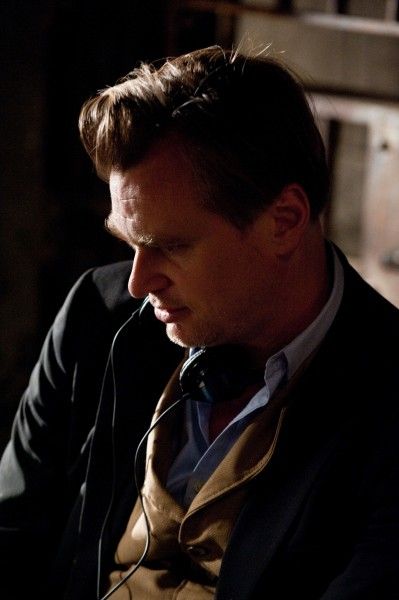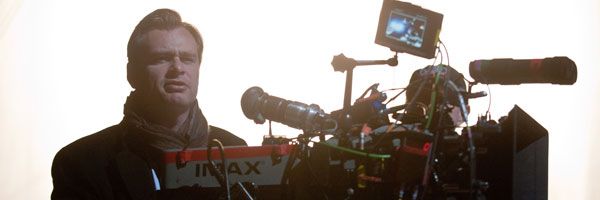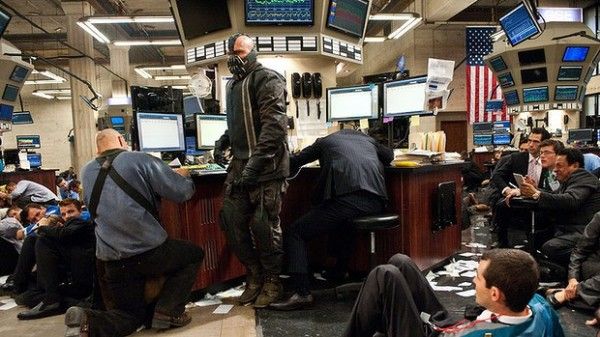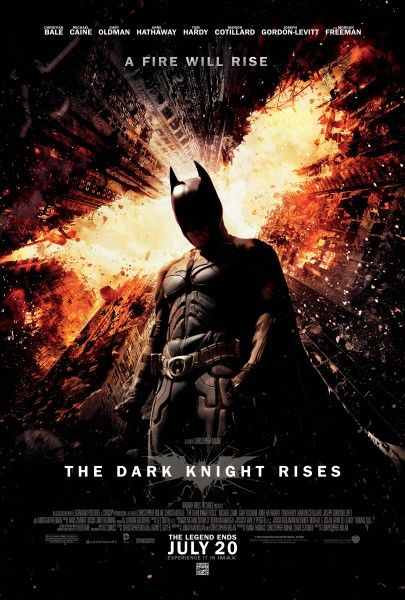Now that The Dark Knight Rises has made its way through its theatrical run, Christopher Nolan has eased up on being so vague about the film, and has done a fascinating interview with Film Comment where he looks back on his history with the Batman franchise. Moving through Batman Begins, The Dark Knight, and The Dark Knight Rises, he talks about the influences of each film, his approach to the stories, how he envisioned Bruce Wayne's behavior throughout the trilogy, and much more. He also touches on the political elements of The Dark Knight Rises, its propulsive final hour, and the "open-ended" conclusion, which he doesn't see as open-ended.Hit the jump for more. The Dark Knight Rises hits Blu-ray/DVD on December 4th. [Spoilers ahead]Speaking to Film Comment, Nolan says the ending of The Dark Knight Rises isn't really meant to open the door for Joseph Gordon-Levitt to play the new Batman (although Warner Bros. may want Gordon-Levitt for the role). The thinking wasn't to create a cliffhanger, but to stress the thematic point of the film:
[Spoilers ahead]Speaking to Film Comment, Nolan says the ending of The Dark Knight Rises isn't really meant to open the door for Joseph Gordon-Levitt to play the new Batman (although Warner Bros. may want Gordon-Levitt for the role). The thinking wasn't to create a cliffhanger, but to stress the thematic point of the film:
CHRISTOPHER NOLAN: For me, The Dark Knight Rises is specifically and definitely the end of the Batman story as I wanted to tell it, and the open-ended nature of the film is simply a very important thematic idea that we wanted to get into the movie, which is that Batman is a symbol. He can be anybody, and that was very important to us. Not every Batman fan will necessarily agree with that interpretation of the philosophy of the character, but for me it all comes back to the scene between Bruce Wayne and Alfred in the private jet in Batman Begins, where the only way that I could find to make a credible characterization of a guy transforming himself into Batman is if it was as a necessary symbol, and he saw himself as a catalyst for change and therefore it was a temporary process, maybe a five-year plan that would be enforced for symbolically encouraging the good of Gotham to take back their city. To me, for that mission to succeed, it has to end, so this is the ending for me, and as I say, the open-ended elements are all to do with the thematic idea that Batman was not important as a man, he’s more than that. He’s a symbol, and the symbol lives on.
This is a statement I strongly disagree with, and I think while the sentiment is nice, it ignores the plot that has come before. Batman may be a symbol, but for a director who stresses the reality of the world he's created, Bruce Wayne's training is essential. It's the entire first act of Batman Begins. It's why Batman isn't a guy wearing hockey pads. Batman couldn't be anyone. He could only be someone who was physically fit and had access to serious resources. That's the reality.
Nolan also spoke about the political aspects of the film, and how it has invited interpretations as advocacy from opposite sides of the political spectrum:
It was interesting to see the spectrum of reactions to The Dark Knight Rises, with some arguing that it was a sort of a neoconservative or very right-wing film and others seeing it as being a radical leftist film. And one of the things the film seems to be talking about is how easily the political rhetoric of one extreme can be co-opted by the complete opposite extreme.
NOLAN: Absolutely, and then you get into the philosophical question: if an energy or a movement can be co-opted for evil, then is that a critique of the movement itself? All of these different interpretations are possible. What was surprising to me is how many pundits would write about their political interpretation of the film and not understand that any one political interpretation necessarily involved ignoring huge chunks of the film. And it made me feel good about where we had positioned the film, because it’s not intended to be politically specific. It would be absurd to try to make a politically specific film about this subject matter, where you’re actually trying to pull the shackles off everyday life and go to a more frightening place where anything is possible. You’re off the conventional political spectrum, so it’s very subject to interpretation and misinterpretation.
My favorite aspect of The Dark Knight Rises is how it wraps you up in a non-stop energy to the point where you can forget about the narrative weaknesses. Nolan says he feels he really was able to build to a satisfying action crescendo with the conclusion of the Batman trilogy:
NOLAN: We tried with all three films, but in the most extreme way with The Dark Knight Rises, what I call this sort of snowballing approach to action and events. We experimented with this in The Dark Knight, where the action is not based on clean and clear set pieces the way Batman Begins was, but we pushed it much further in this film. The scope and scale of the action is built from smaller pieces that snowball together so you’re cross-cutting, which I love doing, and trying to find a rhythm in conjunction with the music and the sound effects, so you’re building and building tension continuously over a long sustained part of the film, and not releasing that until the very last frame. It’s a risky strategy because you risk exhausting your audience, but to me it’s the most invigorating way of approaching the action film. It’s an approach I applied with Inception as well, to have parallel strands of tension rising and rising and then coming together. In The Dark Knight Rises, from the moment the music and sound drop and the little boy starts singing “The Star-Spangled Banner,†it’s kind of like the gloves are coming off. I’ve been amazed and delighted how people have accepted the extremity of where things go.



